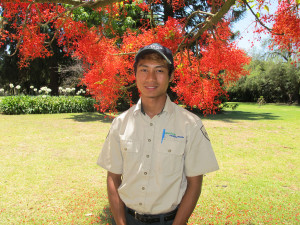Migrants happy to be here – survey finds

Karen Burmese refugee, Hsar.
Recent migrants are amongst the happiest people in Australia, according to a new study by the Australian Bureau of Statistics (ABS).
The General Social Survey 2014, released last week, found Australians rated their overall life satisfaction as 7.6 out of 10; but recent migrants scored slightly higher at 7.7.
On its own the difference is statistically insignificant but a breakdown of average household incomes in the Fairfield area shows the average household income for south-west Sydney is below the state average of $53,917 a year.
Recent migrants – those born overseas and settling here after 2004 – have proportionally lower education (not having a university degree) which is often tied to financial security and opportunity — all strong indicators of life satisfaction, according to the ABS survey.
But the group responded with the highest 10 rating in the survey, with 16.6 per cent of respondents giving their lives a perfect 10.
Karen Burmese refugee Hsar Thein Ju, 22, who arrived from a refugee camp in Thailand in 1980, said that compared to the life he would have had, Australia was “heaven”.
“Coming to Australia has been a blessing for me and my family,” said the trainee park ranger.
“When I first came here I had nothing and I didn’t know the language. Now I have a great job, a girlfriend and I feel like I have a home.
“It’s very exciting. It’s been my aim, my dream, to one day become a park ranger,” Hsar said.
“I love working with the natural environment; with plants and trees,” he said.
“Australia has been good for me. It’s a ten out of ten,” he said.
Migrants who arrived in Australia in the past ten years reported different social and economic outcomes relative to people born in Australia.
On some measures, there were also differences between migrants who spoke English only and those who spoke other languages.
In 2014, almost a third of Australia’s population aged 15 years and over were born overseas, with recent migrants representing 28 per cent of these people.
“Recent migrants were less likely than people born in Australia to have done voluntary work in the last 12 months (22 per cent compared with 34 per cent) and less likely to have cared for a person with disability, a long term health condition or old age in the last four weeks (5.7 per cent compared with 21 per cent),” the ABS report said.
“These findings seem to be connected to the relatively short length of time that recent migrants have been in Australia. This is reflected in GSS data showing that migrants who had been in Australia longer were more likely than recent migrants to have done voluntary work in the last 12 months (28 per cent) and to have cared for a person with disability, a long term health condition or old age in the last four weeks (18 per cent),” it said.
“Other migrants were also more likely than recent migrants to have participated in civic and political groups (13 per cent compared with 8.6 per cent). These changes suggest migrants accrue more social capital as their networks in Australia develop over time.”
Previous GSS data has shown that the extent to which migrants participate in social and support groups is greater the longer they reside in Australia.
In 2014, recent migrants were less likely than people born in Australia to have someone outside the household they could confide in.
Also, they were more likely to have experienced some form of discrimination, but less likely to have experienced two or more incidents of crime in the last 12 months.
“For some measures, outcomes were different for migrants who spoke English only, compared with those who spoke other languages,” the report said.
“For example, recent migrants who spoke other languages were less than half as likely to actively participate in civic and political groups as recent migrants who spoke English only (6.3 per cent compared with 14 per cent).
The survey found females slightly happier than males; those over 75 years were the happiest of all with a score of 8.1 out of ten.
Bisexual people or those with a mental health problem were least happy with a rating of 6.6 out ten and single parents scored 7 out of 10.
Laurie Nowell
AMES Senior Journalist












